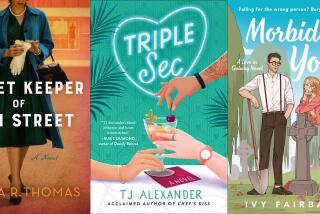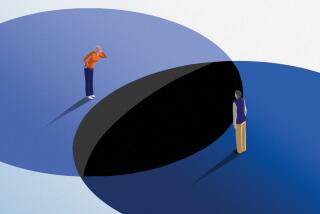Daum: Amazon’s algorithm of love
- Share via
Just in time for Valentine’s Day, Amazon, the behemoth online retailer and knower of all habits and tastes, has released a list of America’s 20 most romantic cities.
It’s high time. Gandhi might have said the best measure of a society is how it treats its weakest members, but we all know that’s a treacly platitude. The best measure of a society is how often its members dine by candlelight, walk along the beach at sunset and give and/or receive heart-shaped Mylar balloons.
And that’s why Amazon’s No. 1 most romantic city is — Knoxville, Tenn.
I know what you’re thinking. There’s a beach in Knoxville? How could it have possibly achieved this status without a beach? Knoxville must have a lot of candles and Mylar balloons.
This raises another question: How many candles and Mylar balloons would it take to compensate for not having a beach? What if you threw in candy and flowers? Do 30 million pounds of Russell Stover chocolates equal 30 miles of beach? Is this how such cities as Cincinnati, Dayton and Erie, Pa., wound up on the list?
As it turns out, Amazon’s view of romance is strictly sales driven. Gathering data on items deemed to be romantic, analysts looked at customer purchases in cities with populations of 100,000 or greater.
According to an Amazon press release, said items included romance novels, relationship guides, DVDs of romantic comedies and “a collection of romantic music from Dean Martin, Barry White, Luther Vandross, Maxwell and Miguel.” Also taken into consideration were “sexual wellness products.”
I typed “sexual wellness” into Amazon’s search field, and the first thing that came up was a supplement called ArginMax Sexual Fitness capsules, the reviews for which (two total)
were divided between “100 percent amazing” and “Did not work.” Then I typed in “relationships” and was directed to the Kindle edition of “Make Him Beg to Be Your Boyfriend in 6 Simple Steps.”
I wondered if there were couples in Knoxville who were madly in love because of this book. I wondered if they were taking ArginMax Sexual Fitness capsules and listening to Barry White while cueing up “The Wedding Singer” on the DVD player. It was almost too kinky to contemplate.
Romance has always been hard to define. But Amazon, clearly, has it figured out. We don’t need actual romance in our lives to “be romantic.” We need only be striving for romance, yearning for it, painfully noting its absence everywhere we go.
That’s why Valentine’s Day, though easy to dismiss as a saccharine vehicle of the greeting-card industry, is actually much more romantic than we think. As Oscar Wilde put it: “The very essence of romance is uncertainty.” And Valentine’s Day is nothing if not uncertain. If we’re in love, we wonder why we have to prove it once a year in the form of cheap gifts (or, worse, expensive ones). If we’re not in love, we wonder if we ever will be. If we’re not in love but dating someone anyway, we wonder how we’ll manage to dump him or her by the 13th.
Regardless, we all hate Valentine’s Day a little. Because, let’s face it, it chokes store shelves with gaudy pink boxes. It terrorizes schoolchildren as they count who got the most cards. It gives us all the same kind of knot in our stomachs as we watch hapless men buying cheap roses from street vendors after work. (The expression on their faces might as well be called the Universal Look of Valentine’s Day: dutiful love mixed with abject fear of being chewed out if they come home empty-handed.)
Marking this holiday doesn’t even require being in an intimate relationship with another human. It’s been estimated that consumers will spent $367 million on gifts for their pets this year.
So maybe the key to getting through Valentine’s Day, partnered, pet owning or otherwise, is to stop worrying and just accept Amazon’s philosophy: Romance is illusory, even with a beach; the best we can do is buy stuff that we’re told signifies it and might even lead to it.
In other words, even folks in Knoxville probably don’t enjoy Valentine’s Day all that much. And if they can’t, who can?
More to Read
A cure for the common opinion
Get thought-provoking perspectives with our weekly newsletter.
You may occasionally receive promotional content from the Los Angeles Times.







